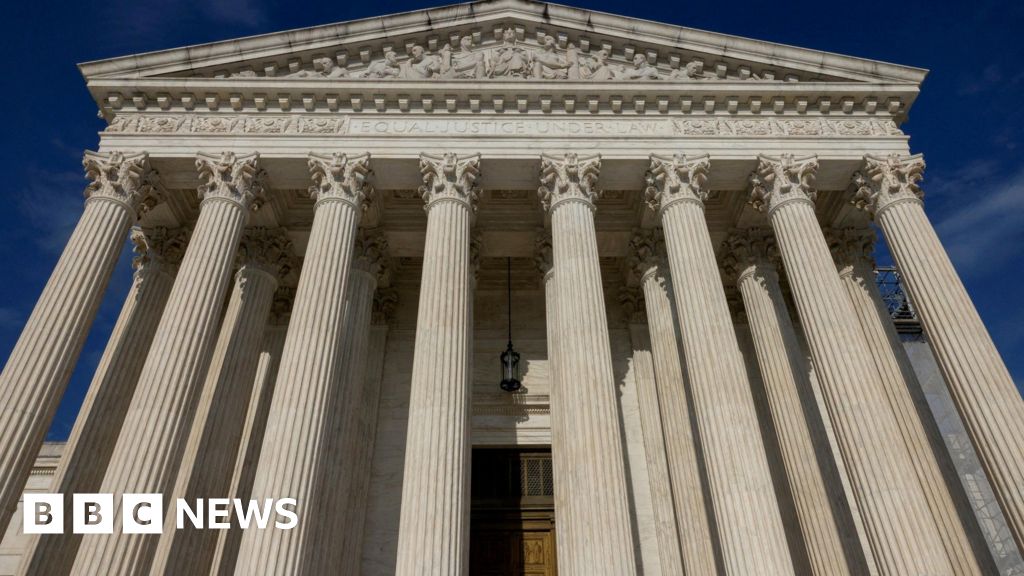Business
Supreme Court Questions Trump’s Tariff Authority in Key Case

The Supreme Court engaged in a critical examination of former President Donald Trump’s authority to impose tariffs, during oral arguments on September 26, 2023. The case raises significant questions about the president’s power to unilaterally set tariff levels on foreign imports, a move that has sparked controversy since its inception.
Chief Justice John Roberts, alongside Justices Amy Coney Barrett and Neil Gorsuch, expressed their skepticism towards the legal foundation of Trump’s tariff actions. During a session lasting over 45 minutes, these justices scrutinized US Solicitor General John Sauer, who represented the administration. They, along with the court’s three liberal justices, challenged the extent of executive authority concerning tariff imposition under federal law and the Constitution.
Roberts articulated concerns over the broad justification used by the president. He noted, “The justification is being used for power to impose tariffs on any product from any country in any amount, for any length of time.” Gorsuch raised a critical point about the potential consequences of a ruling in favor of Trump, questioning, “What would prohibit Congress from just abdicating all responsibility to regulate foreign commerce?” He further indicated his difficulty in accepting Sauer’s arguments.
The legal backdrop of the case revolves around the International Emergency Economic Powers Act (IEEPA), a 1977 law that Trump’s legal team argues grants the president the authority to impose tariffs during national emergencies. Despite the Constitution designating tariff powers to Congress, Trump contends that he has received delegated “emergency” authority to sidestep traditional legislative processes.
In his defense, Sauer emphasized the existence of unprecedented national crises, stating that the situation warranted emergency measures. He cautioned that a ruling against Trump’s tariff powers could lead to “ruthless trade retaliation” and result in adverse economic and national security implications for the United States.
Trump first invoked the IEEPA in February 2023, imposing tariffs on imports from China, Mexico, and Canada, citing drug trafficking as an emergency. He subsequently expanded this action in April, imposing levies ranging from 10% to 50% on goods from nearly all countries, justifying this by highlighting the trade deficit as an “extraordinary and unusual threat.”
Legal representatives challenging the administration have argued that the IEEPA does not explicitly mention tariffs and questioned whether the cited issues, particularly the trade deficit, constituted the sort of emergencies that the law was intended to address. Sauer countered these claims, asserting that presidents possess broad powers over national security and foreign policy, which he argued the challengers sought to undermine.
A pivotal consideration for the justices is whether Trump’s tariffs should be classified as a tax, a power explicitly reserved for Congress in the Constitution. Sauer maintained that the tariffs serve as a regulatory measure and any revenue generated is merely “incidental.” Despite this, Trump has highlighted the significant revenue from tariffs, boasting of billions generated thus far and its importance to the federal budget.
A ruling in favor of Trump would overturn decisions made by three lower courts that previously ruled against the administration. The implications of the Supreme Court’s decision could affect approximately $90 billion in import taxes already paid, which represents nearly half of the tariff revenue collected in the United States through September 2023, according to Wells Fargo analysts.
Should the court delay its ruling until June 2024, that sum may increase dramatically to an estimated $1 trillion. In light of potential adverse outcomes, White House press secretary Karoline Leavett indicated that the administration is preparing alternative strategies for imposing tariffs. “The White House is always preparing for Plan B,” she remarked, underscoring the administration’s proactive approach to potential legal setbacks.
As the Supreme Court deliberates, the ramifications of its decision will resonate through economic and legislative avenues, shaping the future of US trade policy and executive power.
-

 Top Stories1 month ago
Top Stories1 month agoRachel Campos-Duffy Exits FOX Noticias; Andrea Linares Steps In
-

 Top Stories1 week ago
Top Stories1 week agoPiper Rockelle Shatters Record with $2.3M First Day on OnlyFans
-

 Top Stories6 days ago
Top Stories6 days agoMeta’s 2026 AI Policy Sparks Outrage Over Privacy Concerns
-

 Sports5 days ago
Sports5 days agoLeon Goretzka Considers Barcelona Move as Transfer Window Approaches
-

 Top Stories1 week ago
Top Stories1 week agoUrgent Update: Denver Fire Forces Mass Evacuations, 100+ Firefighters Battling Blaze
-

 Top Stories1 week ago
Top Stories1 week agoOnlyFans Creator Lily Phillips Reconnects with Faith in Rebaptism
-

 Top Stories5 days ago
Top Stories5 days agoWarnock Joins Buddhist Monks on Urgent 2,300-Mile Peace Walk
-

 Entertainment6 days ago
Entertainment6 days agoTom Brady Signals Disinterest in Alix Earle Over Privacy Concerns
-

 Top Stories7 days ago
Top Stories7 days agoOregon Pilot and Three Niece Die in Arizona Helicopter Crash
-

 Top Stories4 days ago
Top Stories4 days agoCBS Officially Renames Yellowstone Spin-off to Marshals
-

 Health2 months ago
Health2 months agoTerry Bradshaw Updates Fans on Health After Absence from FOX NFL Sunday
-

 Sports4 days ago
Sports4 days agoSouth Carolina Faces Arkansas in Key Women’s Basketball Clash




